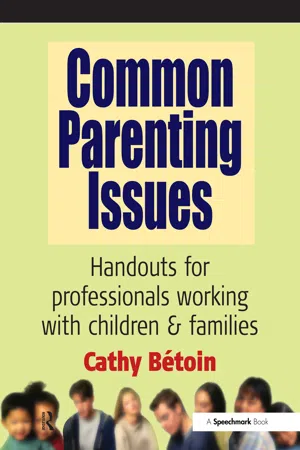
Common Parenting Issues
Handouts for Professionals Working with Children and Families
Cathy Betoin
- 112 Seiten
- English
- PDF
- Über iOS und Android verfügbar
Common Parenting Issues
Handouts for Professionals Working with Children and Families
Cathy Betoin
Über dieses Buch
Are you a professional who encounters children with a wide range of difficulties? Do you also work with their parents? Would you like a flexible source of information to support you in your work? This CD-ROM resource pack has been designed for you, and will be an invaluable asset to your health centre, children's centre, playgroup, nursery or school. Each of the handouts deals with one issue in detail. Topics include sleep, eating, behaviour, language and communication delays, attention deficits, sibling relationships, anxiety, jealousy, depression, bullying, death, divorce and trauma. Designed as a high-quality leaflet, the handouts can be printed from the CD or photocopied from the book and either made available to individuals, or used to develop an accessible information rack for parents. Covering the full range of issues encountered by parents of children up to the age of sixteen, the leaflets provide clearly written guidance on how to help children with some of the common problems encountered in family life. Suitable for families attending your surgery, family centre, community mental health team, school, nursery, social work, psychology or psychiatry department.
Häufig gestellte Fragen
Information
Inhaltsverzeichnis
- Cover
- Half Title
- Title Page
- Dedication
- Acknowledgements
- Copyright Page
- Contents
- Preface
- Introduction
- Index of leaflets for professionals and parents
- 1 Welcome to our Child Development Service
- 2 Carrying out your own developmental assessment: 0–5 years
- 3 Using a developmental assessment to support early intervention with your child
- 4 Carrying out your own developmental assessment: 6–16 years
- 5 Looking at your family history
- 6 Parenting children from birth to 16 years
- 7 How stress affects parenting, and how to help yourself
- 8 Helpful patterns in healthy families
- 9 What is assertiveness and how can it help parenting?
- 10 Encouraging a secure attachment between you and your child
- 11 Thinking about thoughts
- 12 Finding calm in a challenging world
- 13 Encouraging eye contact: the beginnings of social communication
- 14 Songs and rhymes to develop language, attention and play skills
- 15 Choosing toys to help your child’s development
- 16 Helping children learn the art of happiness
- 17 Supporting your child’s self-confidence, self-esteem and optimism
- 18 Building your child’s self-esteem and confidence
- 19 Helping your child develop concentration skills and maturity
- 20 Helping babies and young children develop good sleep patterns
- 21 Helping children eat well
- 22 Playing with your baby: helping your baby and yourself
- 23 Helping young children learn to talk
- 24 Encouraging good behaviour
- 25 Encouraging good behaviour in children with disabilities
- 26 Using praise effectively
- 27 Hitting and kicking, spitting, biting and swearing
- 28 Playing with your child: helping your child and yourself
- 29 Time for your teenager: helping your teenager and yourself
- 30 Learning to listen: helping children with their feelings
- 31 Helping siblings to get on with each other
- 32 Helping temperamentally challenging children
- 33 Helping children with fears and anxiety
- 34 Helping children with jealousy
- 35 Coping with irritability, sulking and a quick temper
- 36 Helping children and adults with depression
- 37 Understanding guilt and shame
- 38 Could my child have an Autistic Spectrum Disorder, and how can I help?
- 39 Could my child have Attention Deficit Hyperactivity Disorder (ADHD), and how can I help?
- 40 Could my child have developmental dyspraxia, and how can I help?
- 41 Could my child have dyslexia, and how can I help?
- 42 Obsessive-compulsive and repetitive behaviours, and how to help your child
- 43 Wetting and soiling, and how to help your child
- 44 Helping children with separation and divorce
- 45 Helping children with death and loss
- 46 Helping children cope with trauma
- 47 Helping children cope with bullying and teasing
- 48 My child may have some special educational needs – what should I do?
- 49 Supporting children with writing
- 50 Supporting children with mathematics
- 51 Becoming a parent of a child with a disability